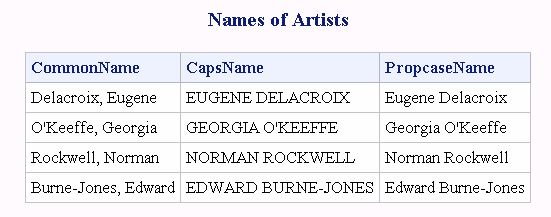PROPCASE Function
Converts all words in an argument to proper case.
| Category: | Character |
| Restriction: | I18N Level 2 functions are designed for use with SBCS, DBCS, and MBCS (UTF8). |
Details
The Basics
The PROPCASE function
copies a character argument and converts all uppercase letters to
lowercase letters. It then converts to uppercase the first character
of a word that is preceded by a blank, forward slash, hyphen, open
parenthesis, period, or tab. PROPCASE returns the value that is altered.
The results of the PROPCASE
function depend directly on the translation table that is in effect
(see TRANTAB= System Option in SAS National Language Support (NLS): Reference Guide) and indirectly on the ENCODING and the LOCALE system options.
Examples
Example 1: Changing the Case of Words
Example 2: Using a Second Argument with PROPCASE
The following example
uses a blank, a hyphen and a single quotation mark as the second argument
so that names such as O'Keeffe and Burne-Jones are written correctly.
data names; infile datalines dlm='#'; input CommonName : $20. CapsName : $20.; PropcaseName=propcase(capsname, " -'"); datalines; Delacroix, Eugene# EUGENE DELACROIX O'Keeffe, Georgia# GEORGIA O'KEEFFE Rockwell, Norman# NORMAN ROCKWELL Burne-Jones, Edward# EDWARD BURNE-JONES ; proc print data=names noobs; title 'Names of Artists'; run;
Copyright © SAS Institute Inc. All rights reserved.
